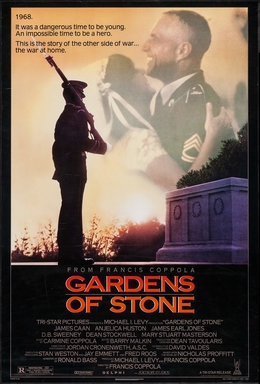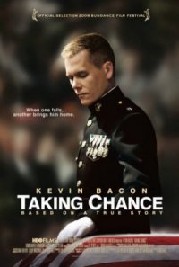VS.
There are so many
war movies that we actually have two that deal with U.S. military death
rituals. “Gardens of Stone” is set in the Vietnam War and dramatizes the role of the Old
Guard in the burial of servicemen at Arlington National Cemetery. “Taking Chance” is the story of the transfer
of a victim of Operation Iraqi Freedom to burial by his family. Both movies are sincere attempts to enlighten
on a topic that is rarely the aftermath of all the celluloid bloodshed.
“Gardens of Stone” is a Francis Ford Coppola film
that came eight years after “Apocalypse Now”.
An eight year period of forgotten films.
The movie was based on a novel by Nicholas Profitt. It takes its name from a nickname for
Arlington National Cemetery. Coppola had
a vastly different experience dealing with the Pentagon on this film. Because of the sincerity of the project, the
military gave total cooperation including filming at Fort Myers and technical
advice to assure the accuracy of the rituals. The script was readily accepted with just the
usual quibbling about profanity. James
Caan came out of semi-retirement (he had not made a movie in five years due to
a bad experience in the making of “Kiss Me Goodbye”) to play the lead. As though the production was not somber
enough, Coppola’s eldest son was killed in a boating accident during the
filming. The boat was piloted by a
drunken cast member.
The movie is set in 1968 at the height of the Vietnam
War, around the time the war was souring in America. Sgt. Hazard (Caan) is a veteran of Korea and
Vietnam who is moldering as part of the Old Guard at Fort Myers. He knows the war is fouled up. “It’s not even a war. There’s nothing to win and no way to win
it.” (Not a bad analysis.) He longs to be transferred to a training
position so he can use his wisdom to save a few of the lambs being led to
slaughter. And prevent them from
becoming one of the constant stream of corpses his unit deals with every
day. His commanding officer and best
friend Sgt. Major Nelson (James Earl Jones) has a bon homme style to balance
Hazard’s moroseness. Some of this is
also tempered by his relationship with a liberal lady journalist named Samantha
(Anjelica Houston). Her anti-war
philosophy has no effect on their feelings toward each other. While wooing Sam, Hazard has found a protégé
in a new arrival in the unit named Willow (D.B. Sweeney). If Hazard can’t go to Vietnam or even the
training school, he is determined to help the gung-ho Willow survive when he
reaches there. (No need to mention that
his death is the most obvious in war movie history since the movie opens with
his funeral.)
 |
| Nelson and Hazard discuss how to win the Vietnam War |
“Gardens of Stone” is not based on a true story, but
it does honor the 1st Battalion, 3rd Infantry Regiment.
Known as the Old Guard, the unit is in charge of Arlington National Cemetery
and the Tomb of the Unknown Soldier. As
such, it does a reverential job in depicting the service of these men. The stress of such a job is clearly
shown. The movie is educational about
military burial procedures and if you have seen “Born on the Fourth of July”,
it will have you pondering the gulf between treatment of the wounded and the
dead during the Vietnam War.
Coppola’s string of misfires did not end with this
movie. The strong cast and fine acting
cannot lift a mundane script. It is the
opposite of “Apocalypse Now” in verve.
That is best seen when you compare Col. Kilgore from “Apocalypse” to Hazard
- the culturally and socially sensitive warrior who collects Persian rugs and
acts as a father figure to Willow. The
plot was so unimpressive that the military vetters went so far as to suggest
some creative changes (along with their concerns with the potty mouths). The somber music by Coppola’s father does not
help. Neither does the ripe dialogue and
the two unrealistic romantic subplots.
Hazard’s relationship with Sam survives his punching out a mouthy
pacifist friend of hers. Even this does
not lead to any meaningful debate on the war between the two. Meanwhile, Willow is courting a girl that
threatens to break it off if he insists on going to the Nam, but when he plays
the duty card, she backs down immediately.
The biggest problem is in Coppola’s lack of focus as far as the
theme. Although clearly anti-war, the
movie takes no stand on the Vietnam War itself.
Coppola claimed the real theme of the film is the family nature of the
military and the traditions and rituals that are so admirable even to most
doves.
“Taking Chance” covers similar ground but without the
melodrama. The movie was based on an
essay written by Lt. Col. Michael Strobl.
Strobl was a Persian Gulf War veteran who was consigned to a desk job
during Operation Iraqi Freedom. His
mixed feelings about choosing family over a tour led to his volunteering to
escort the body of Chance Phelps back to his home in Montana. The diary he kept of the week led to the
essay and it was optioned by HBO. Strobl
co-wrote the screenplay and won a Writers’ Guild of America award. The movie was so well made that it was shown
at the Sundance Festival. It premiered
on HBO to the highest audience for an original film in the previous five
years. It was nominated for ten Emmies
and star Kevin Bacon won the Golden Globe and Screen Writer’s Guild awards for
acting in a miniseries or television movie.
The movie was so well received that Secretary of Defense Robert Gates
admitted that it was a factor in allowing the press access to the transfer of
bodies at Dover Air Force Base.
The movie opens in April, 2004. A black screen does not distract from the
noises of combat that resulted in the death of a PFC Phelps near Riwadi in
Iraq. (He was on a machine gun in a
Humvee escorting a convoy when he was hit
during an ambush.) Two Marines arrive at
a rural home in Montana. After that
subtle set-up, we meet Strobl. He is
languishing pushing paper while his brethren fight and die for their country. The least he can do is honor their
sacrifice. He volunteers to escort
Chance’s body. The movie has almost a
documentary feel as it walks us through all the steps of the process. Strobl is our framing agent as he goes where
the corpse goes and encounters the respectful public along the way. The movie culminates with the funeral with
all its military trappings.
The word that best describes “Taking Chance” is
sincere. You will not get a better
tutorial on how the military treats a
fallen hero in the modern age. This
realism is at the sacrifice of drama, however.
I have no reason to believe the movie is not very accurate. In that case, can you complain about the
absence of false theatrics? No, but
there is absolutely no conflict in the movie.
The movie skips the scene where the parents learn about their son’s
death. It also does not flashback to
Chance’s death. No one utters a negative
word. Every person, even strangers, is
properly respectful. The movie is
apolitical and has nothing to say about the war Phelps died in. There is no attempt to question whether
Strobl was wise to stay home with his wife and kids. It is not cut from the modern war movie
style. Compare it to “In the Valley of
Elah”, for instance. Unlike most war
movies about America’s post-WWII wars, there is no theme of our dead soldiers
deserve better or Americans do not care about their sacrifices. It is not an overtly emotional movie. Bacon won some acting awards, but to tell the
truth it was an easy role. He plays a
Marine (with no PTSD) returning a dead body.
‘Nuf said.
These are two radically different movies on similar
subjects. Both are worth viewing so you
can see the rituals involved in military funerals. “Gardens of Stone” burdens the tutorial with
a melodrama that is not strong. “Taking
Chance” is almost a docudrama and is straight-forward. “Gardens of Stone” has the added burden of
being a perplexing misfire from a supposedly great director. “Taking Chance” was an overachiever.
GARDENS OF STONE = C
TAKING CHANCE = B


You information is so good i really liked it..!
ReplyDeleteKandla Grey Sandstone
Agree as a 68-71 navy vet that grew up at ft benning with a sgt dad it doesnt present the HELL. of living that life and reading a full page of small print names of the fallen young boys many my high school classmates all due to president johnson a very wicked organism not worthy of being a human.uggggg#$=×*^*
ReplyDelete